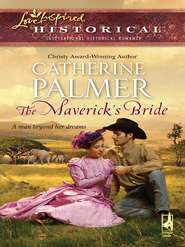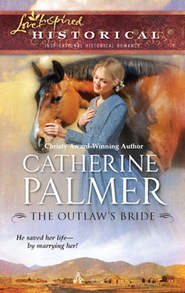По всем вопросам обращайтесь на: info@litportal.ru
(©) 2003-2024.
✖
The Briton
Настройки чтения
Размер шрифта
Высота строк
Поля
The Briton
Catherine Palmer
Indulge your fantasies of delicious Regency Rakes, fierce Viking warriors and rugged Highlanders. Be swept away into a world of intense passion, lavish settings and romance that burns brightly through the centuriesLady Bronwen, proud inheritor of the ancient ways of the Britons, had lost all she held dear. She had been widowed in war, then robbed of the ancestral home that was her birthright. now her last hope was a stranger–one with whom she'd shared a single tender kiss. The foreign knight Jacques le Brun begged her to let him defend her honor–nay, her very life.But he owed fealty to the hated French who had conquered her country, Engl, to the new faith they brought with them. Could Bronwen place her trust in the pure, untainted love she saw shining in this man's eyes– follow him to a new world. . . ?
Catherine Palmer
The Briton
www.millsandboon.co.uk (http://www.millsandboon.co.uk)
For Mary Edstrom Robitschek, my dear friend,
encourager and prayer warrior. Thank you for
loving and supporting me all the way back to
Rosslyn Academy in Kenya, and for helping me
survive seventh grade math.
Contents
Acknowledgments
Chapter One
Chapter Two
Chapter Three
Chapter Four
Chapter Five
Chapter Six
Chapter Seven
Chapter Eight
Chapter Nine
Chapter Ten
Chapter Eleven
Chapter Twelve
Chapter Thirteen
Chapter Fourteen
Chapter Fifteen
Acknowledgments
My great thanks to four special people.
To my agent, Karen Solem, for representing me
with such love and care. To my editor, Joan Golan,
for believing in The Briton twenty-three years after
I wrote it. To Mary Robitschek, for transcribing all
694 pages of the manuscript from hard copy to disk.
To Tim Palmer, for seeing the potential in the
first book I ever wrote and for reading and
editing its 694 pages more times than either of us
likes to remember. May God bless you all.
Chapter One
December 1152
Amounderness in northeast England
Like some relic of a half-forgotten age, the Viking longboat sliced through the icy waters of the natural harbor. Its once brightly painted bow was scarcely visible through a thick coating of barnacles and algae. The sails hung limp and tattered.
A soft dipping of oars drifted through the mist toward an ancient walled keep, where a thin shaft of light from an open window glimmered on the water. An anchor suddenly splashed into the water, shattering the light.
The dark-haired young woman at the window of the keep watched as a small boat, heavily laden with armed men, left the longboat and made its way to shore. A burly old Viking lord stepped from the boat and waded to the beach. Then, with a shout that echoed into the marrow of the woman’s bones, he called his men to follow him across the hard sand toward the stronghold.
“The barbarian has come,” the woman whispered as she barred the wooden shutter.
She turned to find her younger sister looking at her with a petulant expression. “Do leave off peering into the night, Bronwen. I want no gloomy tidings on the eve of our winter feast. Just look how Enit has arranged my tunic. Please come and drape it properly.”
A chill ran through Bronwen as she hurried from the window across the rush-covered wooden floor toward her sister, who stood by a fire built on a stone hearth in the center of the room. The warm flicker of the flames served only to intensify Bronwen’s discontent. And the smoke, drifting upward to the vents in the roof, filled her nostrils with an acrid tang.
How could her father invite the Viking to their feast? To her, the barbarian stood for everything evil that her people, the Briton tribe, had worked so hard and so long to defeat. Vikings! Raiders of villages, ravishers of women, pillagers of the countryside. Why would her father, with the Viking threat all but over, extend the arm of friendship to this barbarian now? Bronwen shook her head in dismay.
But she was forced to smile as she caught sight of Gildan fussing over the folds of her tunic with the nursemaid.
“Sister, you look lovely just as you are,” Bronwen admonished. “Let me help you with your gown, and then I shall plait your hair. Most of the guests have arrived, and Father will be growing impatient.”
Catherine Palmer
Indulge your fantasies of delicious Regency Rakes, fierce Viking warriors and rugged Highlanders. Be swept away into a world of intense passion, lavish settings and romance that burns brightly through the centuriesLady Bronwen, proud inheritor of the ancient ways of the Britons, had lost all she held dear. She had been widowed in war, then robbed of the ancestral home that was her birthright. now her last hope was a stranger–one with whom she'd shared a single tender kiss. The foreign knight Jacques le Brun begged her to let him defend her honor–nay, her very life.But he owed fealty to the hated French who had conquered her country, Engl, to the new faith they brought with them. Could Bronwen place her trust in the pure, untainted love she saw shining in this man's eyes– follow him to a new world. . . ?
Catherine Palmer
The Briton
www.millsandboon.co.uk (http://www.millsandboon.co.uk)
For Mary Edstrom Robitschek, my dear friend,
encourager and prayer warrior. Thank you for
loving and supporting me all the way back to
Rosslyn Academy in Kenya, and for helping me
survive seventh grade math.
Contents
Acknowledgments
Chapter One
Chapter Two
Chapter Three
Chapter Four
Chapter Five
Chapter Six
Chapter Seven
Chapter Eight
Chapter Nine
Chapter Ten
Chapter Eleven
Chapter Twelve
Chapter Thirteen
Chapter Fourteen
Chapter Fifteen
Acknowledgments
My great thanks to four special people.
To my agent, Karen Solem, for representing me
with such love and care. To my editor, Joan Golan,
for believing in The Briton twenty-three years after
I wrote it. To Mary Robitschek, for transcribing all
694 pages of the manuscript from hard copy to disk.
To Tim Palmer, for seeing the potential in the
first book I ever wrote and for reading and
editing its 694 pages more times than either of us
likes to remember. May God bless you all.
Chapter One
December 1152
Amounderness in northeast England
Like some relic of a half-forgotten age, the Viking longboat sliced through the icy waters of the natural harbor. Its once brightly painted bow was scarcely visible through a thick coating of barnacles and algae. The sails hung limp and tattered.
A soft dipping of oars drifted through the mist toward an ancient walled keep, where a thin shaft of light from an open window glimmered on the water. An anchor suddenly splashed into the water, shattering the light.
The dark-haired young woman at the window of the keep watched as a small boat, heavily laden with armed men, left the longboat and made its way to shore. A burly old Viking lord stepped from the boat and waded to the beach. Then, with a shout that echoed into the marrow of the woman’s bones, he called his men to follow him across the hard sand toward the stronghold.
“The barbarian has come,” the woman whispered as she barred the wooden shutter.
She turned to find her younger sister looking at her with a petulant expression. “Do leave off peering into the night, Bronwen. I want no gloomy tidings on the eve of our winter feast. Just look how Enit has arranged my tunic. Please come and drape it properly.”
A chill ran through Bronwen as she hurried from the window across the rush-covered wooden floor toward her sister, who stood by a fire built on a stone hearth in the center of the room. The warm flicker of the flames served only to intensify Bronwen’s discontent. And the smoke, drifting upward to the vents in the roof, filled her nostrils with an acrid tang.
How could her father invite the Viking to their feast? To her, the barbarian stood for everything evil that her people, the Briton tribe, had worked so hard and so long to defeat. Vikings! Raiders of villages, ravishers of women, pillagers of the countryside. Why would her father, with the Viking threat all but over, extend the arm of friendship to this barbarian now? Bronwen shook her head in dismay.
But she was forced to smile as she caught sight of Gildan fussing over the folds of her tunic with the nursemaid.
“Sister, you look lovely just as you are,” Bronwen admonished. “Let me help you with your gown, and then I shall plait your hair. Most of the guests have arrived, and Father will be growing impatient.”










